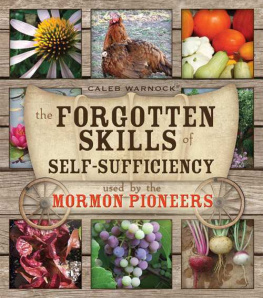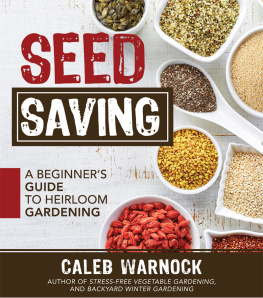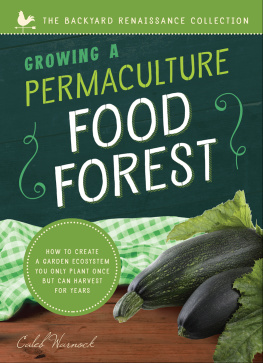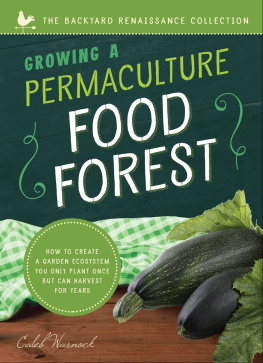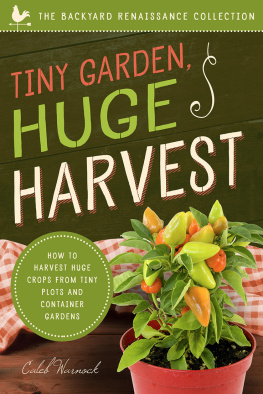2011 Caleb Warnock
All rights reserved.
The views expressed within this work are the sole responsibility of the author and do not necessarily reflect the position of Cedar Fort, Inc., or any other entity.
No part of this book may be reproduced in any form whatsoever, whether by graphic, visual, electronic, film, microfilm, tape recording, or any other means, without prior written permission of the publisher, except in the case of brief passages embodied in critical reviews and articles.
ISBN 13: 978-1-59955-510-2
LIBRARY OF CONGRESS CATALOGING-IN-PUBLICATION DATA
Warnock, Caleb (Caleb J.), 1973- author.
The forgotten skills of self-sufficiency used by the Mormon pioneers / Caleb Warnock.
pages cm
Includes bibliographical references.
ISBN 978-1-59955-510-2
1. Self-reliant living--Handbooks, manuals, etc. 2. Mormon pioneers--Social life and customs. I. Title.
GF78.W37 2011
640--dc22
2010046688
Published by Bonneville Books, an imprint of Cedar Fort, Inc.,
2373 W. 700 S., Springville, UT 84663
Distributed by Cedar Fort, Inc., www.cedarfort.com
Cover and page design by Danie Romrell
Cover design 2011 by Lyle Mortimer
Edited by Melissa J. Caldwell
Printed in China
1 0 9 8 7 6 5 4 3 2 1
Printed on acid-free paper
For my grandparents and parents who taught me to think, then work: Phill & Billie Nielson, Robert & Phyllis Warnock, DeWayne & Pat Warnock
To the Buy the Book writers group for years of truth and buckets of love: Laura Andersen, Ginger Churchill, Matt and Brooklyn Evans, Jenifer Lee, Eric James Stone
To the Smashing Stories writers group for investing time in talent: Maegan Langer, Steph Lineback, Scott Livingston, Janiel Miller, Cally Stephens-Nielson, Loraine Scott, Maleah Warner
To the American Fork Arts Council, and particularly Lori England, for their support of local writers, to all my students over the years, to the team at Cedar Fort Publishing for believing in this book, to the fantastic staff of the Orem Public Library and Utah's Pioneer Online Library, and to Barbara Christiansen for her early reading of the manuscript.
Most of all, to the beauty who transplanted raspberries on our first date, my wife, Charmayne. You are the poetry of my life. This book is for you.
Purple Dame's Rocket flowers in bloom in spring beneath apple trees. The family barn can be glimpsed through the trees.
I have just come in from gathering the last eggs of the day, a half dozen in shades of brown, white, and green. Triple-digit heat scorched us today, and now the rolling night air is a pleasure and relief. As I write, platinum lightning splits the night sky over central Utah, accompanied by the primordial crack of thunder.
Blasting thunder and strobe lightning are among the last physical connections today's gardeners have to the pioneers who settled this land. The sound, especially in July, still forebodes either a welcome cloudburst or the threat of wildfire along the sundried mountainside, and sometimes both. Usually, summer dusk provides a pause for a last check of the garden crops, a moment to list the tasks of the upcoming day. But not tonight. Tonight, I've been chased indoors by Mother Nature.
Most gardens in the West have just begun to yield in July. August brings an unparalleled bounty from the soil, followed by September's grand finale of winter squash, grapes, pumpkins for carving, and the last beans from the vines.
But this narrowed window of plenty is a modern invention.
For millennia, families could have ill afforded to harvest sustenance from the garden only three months of the year. A year-round supply of homegrown foodstuffs was the only insurance against starvation. Using truly simple techniques, homestead families harvested sweet, crisp carrots out of the snow-blanketed garden soil in December, January, and February. Still today, those who have tasted winter carrots recall longingly their sugary flavor and snappy texture, outweighing by far carrots harvested at any other time of the year. These days, fresh winter garden carrots are among the rarest of vegetables.
The pioneers raised robust summer vegetables without expensive seed catalogs or nurseries. They created spectacular flower gardens at no cost. They ate fresh out of the garden twelve months a year, a skill that has now all but vanished. Their self-sufficiency provided security against lost wages, harsh weather, economic depression and recession, and commercial contamination and shortages .
Until World War II, the backyard harvest was almost the inverse of today's garden. The harvest extended so far across the calendar that a simple phrase described the brief time when the garden could not be counted on to feed the family. In lean years, that hunger gap lasted from late winter, when the stored food and winter vegetables had been used up, until the first perennial greens appeared in spring. Few now recall that when the pilgrims arrived at Plymouth Rock, dandelions did not dot the United States. The plants were brought here later by immigrants who valued them for being the plant that broke the hunger gap each spring, for both people and honeybees.
Today, that pioneer ability to provide food security and self-reliance has never been more appealing to families. As food and fuel prices fluctuate, many of us are taking a deeper look at homegrown food, thrift, and self-sufficient living. In a sign of our uncertain economic times, families across the country are even beginning to keep chickens again. There is a growing desire to learn anew the skills of independence that marked the lives of the Mormon pioneers.
Many of their techniques are now lost to the general population. I was lucky enough to grow up in the kitchens and gardens of the last generation to provide family meals without relying on the grocery store. My great-grandmother's supermarket was her garden and storeroom. My grandparents shook their heads at bland, store-bought vegetables. They managed their family budgets by putting to work centuries of received wisdom about food and self-reliant living. This book attempts to record some of what remains known of their methods, to demonstrate just how simple and fulfilling the path to increased providence can bealong with the pleasure of eating fresh garden produce with robust, homegrown flavor all year round.
This is not a book about bottling peaches or digging a root cellar. This book begins to overcome the myth that self-reliant living is practical only for up-before-dawn farmers or green-thumb gardeners with huge yards and no social life. The reality is that self-sufficiency need not be elaborate, time-consuming, or backbreaking. Any modern family can be strengthened by discovering the forgotten skills of self-sufficient living used by the Mormon pioneers.








